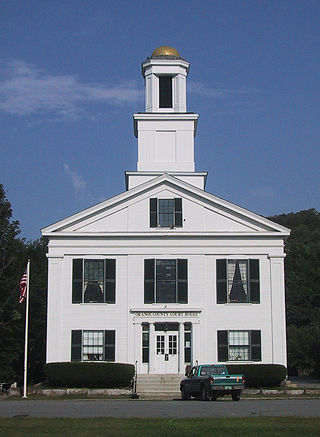
Orange County is a county located in the U.S. state of Vermont. As of the 2020 census, the population was 29,277. Its shire town is the town of Chelsea. Orange County was organized on February 2, 1781, as an original county within the state.

Fairlee is a town in Orange County, Vermont, United States. The population was 988 at the 2020 census. It includes the village of Ely. Fairlee is home to Lake Morey, which claims to have the longest ice skating trail in the United States.
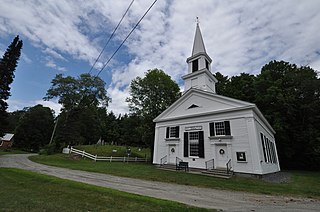
West Fairlee is a town in Orange County, Vermont, United States. The population was 621 at the 2020 census.

Camping is a form of outdoor recreation or outdoor education involving overnight stays with a basic temporary shelter such as a tent. Camping can also include a recreational vehicle, sheltered cabins, a permanent tent, a shelter such as a bivy or tarp, or no shelter at all. Typically, participants leave developed areas to spend time outdoors, in pursuit of activities providing them enjoyment or in a form of educational experience. Spending the night away from home distinguishes camping from day-tripping, picnicking, and other outdoor activities.
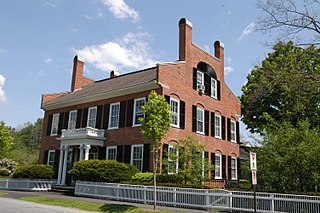
Woodstock is an incorporated village located within the town of Woodstock in Windsor County, Vermont, United States. As of the 2020 census, the village population was 900.

Founded in 1885 by Sumner F. Dudley, Camp Dudley is the oldest continually running boys camp in the United States. It is located in Westport, New York, on the shores of Lake Champlain. In 1993, it was included within the Camp Dudley Road Historic District when listed on the National Register of Historic Places.
Camp Widjiwagan is a YMCA camp based on Burntside Lake near Ely, Minnesota, United States.

Canoe Island is a 47-acre (19-hectare) island located in the center of the San Juan Islands, an archipelago in the U.S. state of Washington. The island is situated in Upright Channel between Shaw and Lopez Islands. Canoe Island's surface is mostly forested with second-growth cedar, fir, hemlock, and madrona, with some old-growth trees, too. Its maximum elevation is 127.7 feet. The rocky shoreline is bordered by dense forests of bull kelp.

The Ponce YMCA Building is a historic structure located in the municipality of Ponce, Puerto Rico. It is located at 7843 Calle Nazaret, Urbanizacion Santa Maria. The structure was listed in the National Register of Historic Places on 4 June 2012.

The Samuel Morey Memorial Bridge is a historic bridge carrying New Hampshire Route 25A across the Connecticut River between Orford, New Hampshire and Fairlee, Vermont. The steel through-arch bridge was built in 1937–38 to replace an older wooden bridge which had been damaged by flooding in 1936. It spans 432 feet (132 m), stands about 35 feet (11 m) above the river, and its arches rise 85 feet (26 m) above the roadway. It rests on poured concrete abutments that have a light Art Deco or Moderne styling. Wing walls recede from the abutments into the banks in three stepped sections. Below the bridge in the river is visible some riprap, stone remnants of the old bridge's abutments and central pier. The bridge is of a "tied arch" design, in which the two arches are joined together by ties to distribute the active load. This is in contrast to the Justice Harlan Fiske Stone Bridge joining Brattleboro, Vermont and Chesterfield, New Hampshire, which was built about the same time, and distributes the active load to its abutments. The bridge components were manufactured by the American Bridge Company; construction was by Hagen-Thibodeau Construction Company at a contracted cost of just over $209,000.
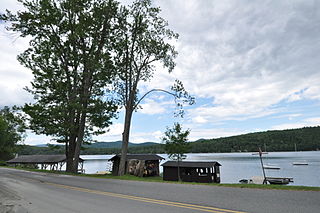
Aloha Camp is a summer camp for girls on Lake Morey in Fairlee, Vermont. Founded in 1905, it is the oldest girls' camp in the state. Open to children aged 12 to 17, it offers outdoor activities, arts and nature programs, and wilderness camping opportunities. The camp season is divided into two sessions of 3-1/2 weeks, running from late June to mid-August. The camp property is listed on the National Register of Historic Places.

Aloha Hive Camp is a summer camp for girls on Lake Fairlee in West Fairlee, Vermont. Founded in 1915 as an expansion of Aloha Camp, it is open to girls aged 7 to 12, with two sessions between mid-June and late August. The camp operates on more than 400 acres (160 ha), offering a variety of outdoor activities as well as a rich arts and crafts program. The camp facilities were listed on the National Register of Historic Places in 2003.
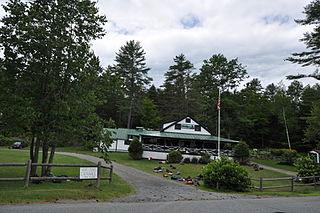
Aloha Horizons Camp is a summer camp for boys and girls on Lake Fairlee in West Fairlee, Vermont. Opened in 1921 as Camp Wyoda, its property was acquired by the Aloha Foundation in 1997, and is now operated by that organization as a day camp for local children and vacationers staying in the area. Camp is divided into three two-week sessions; activities include water sports, land sports, and arts and crafts. The camp property, organized around a former farmstead, was listed on the National Register of Historic Places in 2003 for its well-kept collection of surviving early camp architecture.
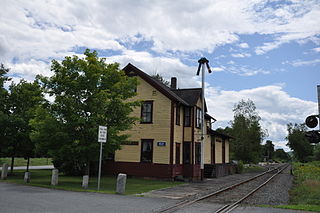
The Ely Railroad Depot is a historic railroad station at Ely Road and Old Route 5 in Fairlee, Vermont. Built in 1900 by the Boston and Maine Railroad, it is a well-preserved rural station, designed to house the stationmaster as well as providing station facilities. It was listed on the National Register of Historic Places in 1994.
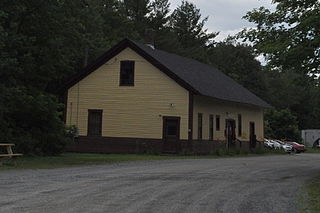
The Fairlee Railroad Depot is a historic railroad station at 320 United States Route 5 in the village center of Fairlee, Vermont. Built in 1848 and used in active service until 1972, it is one of the few surviving first-generation railroad station buildings in the state. Now used as a retail space, it was listed on the National Register of Historic Places in 1998.

Fairlee Town Hall, at 75 Town Common Road, is the municipal heart of Fairlee, Vermont. It was built in 1913 to a design by a local architect, replacing the old Fairlee Opera House, which was destroyed by fire in 1912. It is a fine example of Colonial Revival architecture, and is a focal point of the village center and the town's civic life. It was listed on the National Register of Historic Places in 2014.

Lanakila Camp is a private summer camp for boys aged 8-14 on Lake Morey in Fairlee, Vermont. Founded in 1922 on the grounds of a 19th-century farm property, it is one of the state's older organized camps, with a significant number of period buildings in the Adirondack rustic style. The camp offers an array of outdoor activities, including water, field sports, and hiking, as well as indoor arts programs, all generally infused with an educational purpose. It has a full 7-week session, as well as two three-and-a-half-week sessions. During the off-season, its facilities are used as the Hulbert Outdoor Center, an educational center for adults, children, school groups and special events including things like weddings. The camp property was listed on the National Register of Historic Places in 2003.

The Asa May House is a historic farmstead on Blood Brook Road in West Fairlee, Vermont. Developed in the late 18th century, the c.1800 house is a rare statewide example of Federal period architecture, built for West Fairlee's first town clerk. The farmstead property, including a barn, sheds, and period landscape elements, was listed on the National Register of Historic Places in 1993.

The West Fairlee Center Church is a historic church building at Middlebrook and Bear Notch Roads in West Fairlee, Vermont. Built in 1855, it is a fine and little-altered example of rural Greek Revival architecture, also notable for the association of its congregation with Nathaniel Niles, a prominent local minister, landowner, and politician. It was listed on the National Register of Historic Places in 2002.
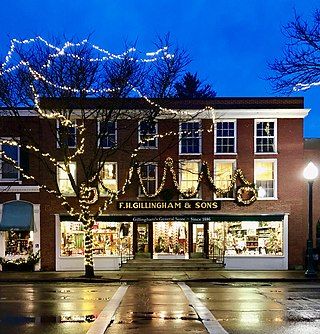
F. H. Gillingham & Sons is a historic general store in Woodstock, Vermont. Specializing in retail and mail order, the company was established in 1886, and is operated by the Billings family.





















